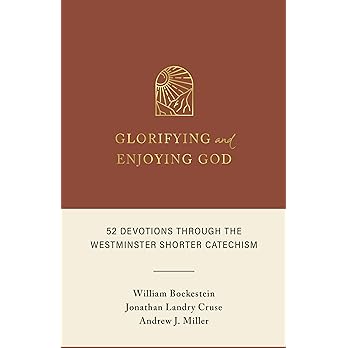When I finish reading or listening to a book, I add it to my annual “books read” list. My 2023 list is at the end of this post.
2023 READING HIGHLIGHTS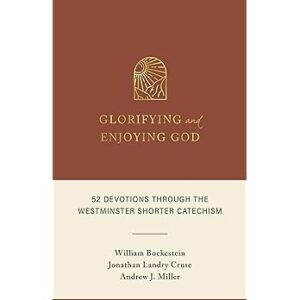
A new book I loved reading and hope finds a wide readership is Glorifying and Enjoying God: 52 Devotions on the Westminster Shorter Catechism by William Bockestein, Jonathan Landry Cruse, and Andrew J. Miller. “Catechisms are small books of big doctrines,” the authors claim, and “boil down Scripture into major theological themes reflecting the high honor Scripture gives to doctrine.” Page by page, the authors back up their claim. The scriptural doctrines set forth in the Westminster Shorter Catechism are presented, accompanied by clear expositions of their biblical foundations. The devotional quality of the book lends itself to profitable personal use by believers at every stage of the Christian life, from teenager to senior saint. Its crisp and well-structured declarations of doctrine make it profitable for officer training, Sunday School classes, and small groups. I review this book in a forthcoming issue of Reformed Faith & Practice.
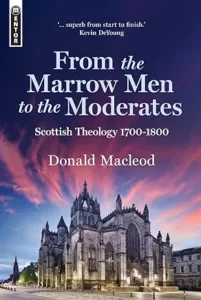
Noted pastor, theologian, and professor Donald Macleod died in May. His final book, From the Marrow Men to the Moderates: Scottish Theology 1700–1800, is a worthy sequel to Therefore the Truth I Speak: Scottish Theology 1500-1700, published in 2020. A gifted storyteller, the author’s biographical sketches and survey of key events and theological literature of the period is superb. Pastors will find the devotional quality of these two volumes refreshing.
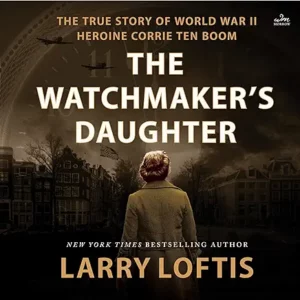
We mustn’t forget the heroes of the Christian faith. One of the 20th century’s greatest was Corrie Ten Boom (1892-1983). A Dutch watchmaker’s daughter, Corrie would have passed her days in obscurity were it not for her family’s courageous decision to shelter Jews in Nazi-occupied Holland. A secret room – a hiding place – was constructed within their home. For two harrowing years, they sheltered refugees until they were arrested by the Gestapo in early 1944. Corrie’s father died soon after their capture, and she and her sister Betsy were sent to the Ravensbrück concentration camp in Germany. There they maintained a strong Christian witness amidst its horrors: leading worship, teaching the Bible, and comforting their fellow prisoners. Betsy would die in the camp; Corrie was released due to a clerical error. Her subsequent speaking and writing ministry spanned the globe, making her one of the most widely recognized Christians of her day. The Watchmaker’s Daughter is Larry Loftis’s fast-paced and inspiring biography of a remarkable life.
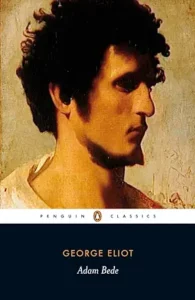
George Eliot is my favorite novelist. During the past few years, I read and reread her seven major novels. Of the novels I’ve read in my lifetime, Middlemarch remains my favorite – there’s not a close second. Her abandonment of her early evangelical Christian faith was tragic. Nevertheless, her knowledge of the scriptures, theology, Christian experience, and the complexities of life make for compelling reading – not to mention her formidable learning and skilled storytelling. Among her lesser-known characters, three stood out to me as I read this year. I find Dinah Morris, the Methodist lay preacher in Adam Bede, and her solicitousness for the spiritual well-being of souls, praiseworthy. In Felix Holt the Radical, the relationship between dissenting minister Rufus Lyon and his stepdaughter, Esther, contains thoughtful conversations about the life of faith, as well as depicting an endearing filial relationship. Eliot was a keen observer of life and those of us who care for people can learn much from her.
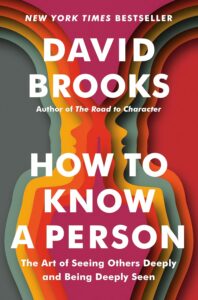
Speaking of observation, I was impressed with David Brook’s How to Know a Person: The Art of Seeing Others Deeply and Being Deeply Seen. As he shares personal examples, historical anecdotes, and the fruits of his extensive readings, he highlights the attitudes and skills necessary for deep listening, sincere empathy, and engaging conversation. All leaders – and especially pastors – must know the people they lead. I found this an important book that I intend to reread in the coming year.
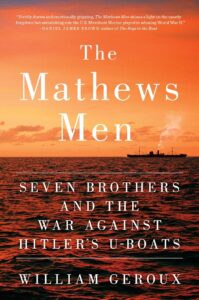
In the early years of America’s involvement in World War II, only the Marine Corps suffered a higher fatality rate than the United States Merchant Marine. The Merchant Marine delivered critical military supplies from around the world to besieged Britain and the Soviet Union. Without the courage of its mariners, the war with Germany would surely have been lost. In The Mathews Men: Seven Brothers and the War Against Hitler’s U-Boats, William Geroux provides a riveting history of the United States Merchant Marine’s war efforts. The story centers primarily on the experience of Mathews County, Virginia, a rural and remote area on the Chesapeake Bay. With a population of 7,500, the county lost 23 mariners out of the numerous fathers, husbands, and sons who served. Many were forced to abandon torpedoed ships, some more than once. The author gives special attention to the sea-faring Hodges family and their courage, devotion to duty, and heart-breaking sacrifices. Along the way, readers learn about U-Boat tactics, and the experiences of the men aboard them.
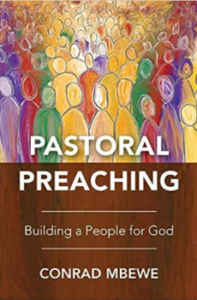
Conrad Mbewe’s Pastoral Preaching provides a reliable roadmap to a God-glorifying and Christ-honoring pulpit ministry. The term itself – pastoral preaching – is beautiful. For those who are called to shepherd congregations, preaching must never be separated from pastoral care. Instead, it must be regarded as a distinct and critical component of it. Although this book was written with an African audience in mind, any preacher will benefit from reading it carefully and prayerfully.
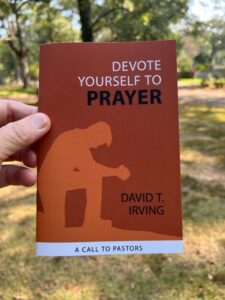
Ordinarily, booklets don’t appear in my reading lists. This year I am making an exception for David Irving’s Devote Yourself to Prayer. “Brother pastors,” he writes, “it is your duty to be devoted to prayer for your people. To put it bluntly, it is your job to pray.” He proceeds to demonstrates from Acts 6:1-7 the principal role of prayer in the apostles’ work. It summons pastors to reflect on the duty, difficulty, discipline, and delight of prayer. His reflections are full of sound Bible teaching, quotations from praying pastors, and practical advice for those who are serious about dedicating themselves to prayer.
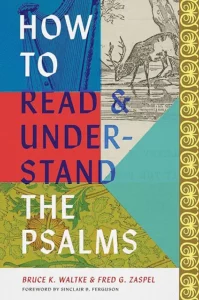
Every pastor should count among his choicest tools, the Psalter, the inspired hymnbook – the inspired prayerbook – of the people of God. To be used effectively, any tool must come with instructions for its proper use. Experienced craftsmen must teach their apprentices – which is why pastors will find How to Read and Understand the Psalms a valuable resource. Like master craftsmen, Bruce Waltke and Fred Zaspel instruct readers about the structure of individual Psalms, explore their various forms, explain the arrangement of the Psalter’s five books, and offer suggestive outlines that will assist pastors and teachers in effectively communicating their message. After reading, pastors will be better prepared to employ the Psalms in their ministerial labors.
MY 2023 READING LIST
- Edward Humes, The Forever Witness: How DNA and Genealogy Solved a Cold Case Double Murder
- Dani Shapiro, Signal Fires
- Jane Austen, Persuasion
- Michael J. Kruger, Bully Pulpit: Confronting the Problem of Spiritual Abuse in the Church
- William Geroux, The Mathews Men: Seven Brothers and the War Against Hitler’s U-Boats
- Conrad Mbewe, Pastoral Preaching: Building a People for God
- Jane Austen, Sense and Sensibility
- Flonzie Brown Wright, Looking Back to Move Ahead: An Experience of History and Hope
- George Eliot, Felix Holt, The Radical
- Guillaume Bignon, Confessions of a French Atheist: How God Hijacked My Quest to Disprove the Christian Faith
- A.B. Simpson, Christ in the Tabernacle
- Wendell Berry, Hannah Coulter
- Linda M. Battisti and John Stevens Berry, The Twelfth Victim: The Innocence of Caril Fugate in the Starkweather Murder Rampage
- Joel R. Beeke, Family Worship
- George Eliot, Romula
- Mary Harrington, Feminism Against Progress
- J. Gresham Machen, Christianity and Liberalism
- Stuart Olyott, Ministering Like the Master: Three Messages for Today’s Preachers
- Dale Ralph Davis, Looking on the Heart: Expositions of the Book of 1 Samuel (vol. 2; chapters 15-31
- Susannah Clarke, Piranesi
- David P. Beaty, Keep Your Spiritual Edge: Lessons from Andrew Bonar for Ministers Today
- Newport, Cal, A World Without Email: Reimagining Work in an Age of Communication Overload
- Tom Holland, Dominion: How the Christian Revolution Remade the World
- Stuart Olyott, Preaching: Pure and Simple
- Leon Uris, Mila 18
- Eudora Welty, One Writer’s Beginning
- Amor Towles, A Gentleman in Moscow
- Carolyn Webber, Surprised by Oxford: A Memoir
- John Bridges, How to Be a Gentleman
- David Benioff, City of Thieves
- Murray Capill, The Heart is the Target: Preaching Practical Application from Every Text
- Larry Loftis, The Watchmaker’s Daughter: The True Story of World War II Heroine Corrie Ten Boom
- Stuart Olyott, A Life Worth Living and a Lord Worth Loving: Ecclesiastes & Song of Solomon
- Derek Kidner, The Message of Ecclesiastes
- Alexander Solzhenitsyn, One Day in the Life of Ivan Denisovich
- David T. Irving, Devote Yourself to Prayer (booklet)
- Bruce K. Waltke and Fred G. Zaspel, How to Read and Understand the Psalms
- Michael J. Glodo, The Lord Bless You and Keep You: The Promise of the Gospel in the Aaronic Blessing
- Sinclair B. Ferguson, Worthy: Living in the Light of the Gospel
- Ursula K. Le Guin, Lavinia
- Virgil, The Aeneid
- Patrick Leigh Fermor, A Time to Keep Silence
- Jim VandeHei, Mike Allen and Roy Schwartz, Smart Brevity: The Power of Saying More with Less
- The Bible
- Gary Yagel, Got Your Back: Helping Men Forge Brotherhood Connections They Need
- Harrison Scott Key, How to Stay Married: The Most Insane Love Story Ever Told
- O. Palmer Robertson: The Christ of Wisdom, A Redemptive-Historical Exploration the Wisdom Books of the Old Testament.
- Jane Austen, Emma
- Jonathan Landry Cruse, The Character of Christ: The Fruit of the Spirit in the Life of Our Savior
- Mark Helprin, The Oceans and the Stars
- Jim Davis and Michael Graham, The Great Dechurching: Who’s leaving, Why Are They Going, and What Will It Take to Bring Them Back?
- Peter J. Leithart, Miniatures and Morals: The Christian Novels of Jane Austen
- William Bockestein, Jonathan Landry Cruse, and Andrew J. Miller, Glorifying and Enjoying God: 52 Devotions on the Westminster Shorter Catechism
- McKay Coppins, Romney: A Reckoning
- Joan Druett, Island of the Lost: Shipwrecked at the Edge of the World
- James M. Garretson, Thoughts on Preaching and Pastoral Ministry: Lessons from the Life and Writings of James W. Alexander
- John Bridges and Bryan Curtis, As a Gentleman Would Say
- Kent Haruf, Plainsong
- David Brooks, How to Know a Person: The Art of Seeing Others Deeply and Being Deeply Seen
- John D. Meade and Peter J. Gurry, Scribes and Scripture: The Amazing Story of How We Got the Bible
- Timothy Keller, The Freedom of Self-Forgetfulness: The Path to True Christian Joy
- Michael Reeves, What Does It Mean to Fear the Lord?
- J.R.R. Tolkien, The Hobbit
- Phillip Zaleski and Carol Zaleski, The Fellowship: The Literary Lives of the Inklings: J.R.R. Tolkien, C. S. Lewis, Owen Barfield, Charles Williams
- Luke A. Nichter, The Year That Broke Politics: Collusion and Chaos in the Presidential Election of 1968
- John Robert Smith, The Church That Stayed: The Life and Times of Central Presbyterian Church in the Heart of Atlanta, 1858-1978
- Stephen J. Casselli, Divine Rule Maintained: Anthony Burgess, Covenant Theology and the Place of the Law in Reformed Scholasticism
- Susan L. Williams and Stephen N. Williams, How Can We Help Victims of Trauma and Abuse
- Leland Ryken, A Journey to Bethlehem: A Treasury of Classic Christmas Devotionals
- Peter Attia, Outlive: The Science and Art of Longevity
- Philip A. Wallach, Why Congress
- Donald Macleod, From the Marrow Men to the Moderates: Scottish Theology 1700–1800
